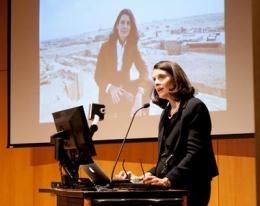
A long-time broadcast journalist and anchor spoke to students about journalism and its evolution through entertainment Tuesday in an event hosted by the Global Center for Journalism and Democracy at Sam Houston State University. Pilgrim is a former CNN correspondent of 24 years. She has anchored her own morning show on CNN and was an anchor for CNN’s primetime broadcast. Her career has taken her around the world, to places like Russia, China, Cuba, the Middle East and South Africa.
Pilgrim highlighted two polar-opposite kinds of audience members in terms of media knowledge: the news junkies and entertainment junkies, or as she called them “Doritos girls,” referencing a photo in her presentation.
The news junkies are up to the minute with news, she said. Entertainment junkies she described as having little to no interest in it.
Pilgrim says although it’s not preferable to have to connect to entertainment junkies through entertainment, it’s something that has to be done. Pilgrim has found that making the stories more interesting rather than simplifying the story is a way of reaching out to the audience.
One example she noted was Kathryn Bigelow’s “Zero Dark Thirty,” a movie based on the killing of Osama Bin Laden. The film educated its viewers by exposing them and not because they intentionally sought out the information.
“When I would come home (from CNN) my sons would be watching Jon Stewart (of Comedy Central’s The Daily Show),” she said. “They learn about what’s going on around the world through a comedic lens.”
With the media world changing constantly, Pilgrim said journalists must accommodate to the increase in digital journalism on social media and the Internet. Visual journalism, she said, began in movie theaters when they would play newsreels before a movie and audience could see pictures from around the world.
“It’s an interesting thing,” Pilgrim said. “But it’s not unusual that news and entertainment being placed in the same form now, it was back then.”
Now journalists can reach out to their audience and hear what they have to say. It is “a new golden age of communication” as Pilgrim explained. She also described this new media as a “digital riptide” where journalism is changing and people cannot fight the riptide as hard as they may try.
An example of this shift, she said, is the rise of citizen journalism from the use of smart phones.
“You can now connect to the world from something in your hand,” she said. “It’s quite interesting.”
To bounce into the so-called infotainment trend she decided to write a novel with facts incorporated in her story, a genre known as “fact-based fiction” as a way to convey facts to the audience. Pilgrim said she wrote every day after her time on-air and the results was “The Explorer’s Code,” her first novel. That was followed by her second, “The Stolen Chalice.”
One way to integrate information and education into her books – besides having all the details fact-based – was to create enhanced e-books. An enhanced e-book has links within the book and shows the reader information, sometimes videos, more about specific information.
“I’m still a journalist but I put myself on assignment,” she said. “I travel all over the world researching for my books.”
In search for information, Pilgrim has traveled to England, Egypt and even the North Pole.
Pilgrim had final advice for writers and authors.
“Write what you love,” Pilgrim said.” Because if you don’t it’s a lot of work.”